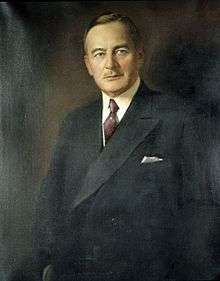Angus Wilton McLean
| Angus W. McLean | |
|---|---|
 | |
| 56th Governor of North Carolina | |
|
In office January 14, 1925 – January 11, 1929 | |
| Lieutenant | Jacob E. Long |
| Preceded by | Cameron A. Morrison |
| Succeeded by | Oliver Max Gardner |
| Personal details | |
| Born |
April 20, 1870 Robeson County, North Carolina |
| Died |
June 21, 1935 (aged 65) Washington D.C. |
| Political party | Democratic |
| Spouse(s) | Margaret French McLean |
| Alma mater | University of North Carolina |
| Profession | Businessman |
Angus Wilton McLean (April 20, 1870 – June 21, 1935) was a lawyer and banker who was the 56th Governor of North Carolina from 1925 to 1929. McLean also served as Assistant Secretary of the United States Department of the Treasury from 1920-1921.
Biography
He was born in Robeson County, North Carolina and educated at the University of North Carolina at Chapel Hill, where he earned a law degree in 1892. McLean first entered politics in 1892, serving as the chairman of the Robeson County Democratic Executive Committee. A supporter of Woodrow Wilson, he was a delegate to Democratic National Conventions and sat on the Democratic National Committee. From 1918 to 1922 he served on the War Finance Corporation board, and from 1920 to 1921 he was the assistant secretary of the Treasury.
McLean secured the Democratic gubernatorial nomination in 1924 by defeating Josiah W. Bailey. During his tenure, an executive budget system was initiated; a department of conservation and development was established; and the Great Smoky Mountains National Park was formed. Governor McLean continued the practice, established by his predecessors Thomas Bickett and Cameron Morrison, of deploying National Guard troops to prevent potential lynchings. After completing his term, McLean retired from political life.
He died on June 21, 1935.
Legacy
His son, Hector (1920–2012), became a bank president and state senator.[1]
Notes
- ↑ News & Observer Archived December 10, 2012, at the Wayback Machine.
References
| Political offices | ||
|---|---|---|
| Preceded by Cameron A. Morrison |
Governor of North Carolina 1925-1929 |
Succeeded by Oliver Max Gardner |
